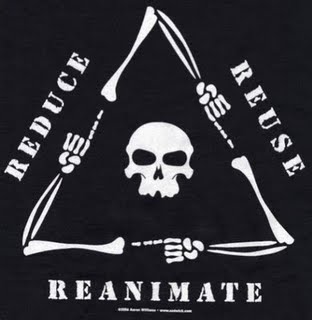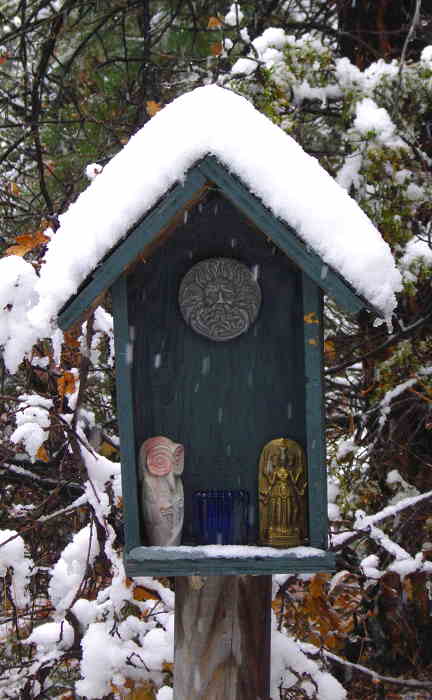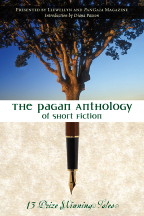Emma Restall Orr is one of the leading figures of British Druidry, and her book
Living With Honour: A Pagan Ethics may be seen as an attempt for formalize the vaguely expressed ethical precepts ("If it harm none," etc.) that characterize contemporary Paganism(s).
Orr herself admits that "Paganism can appear fragmented " but that its diversity of belief and approach "is not always helpful those trying to grasp comprehension from the outside" (11). (I think she means, "Comprehend it from the outside.)
As have a number of other Pagan writers, she feels moved to act partly by social pressures. In order for Pagans and their concerns (e.g., "appropriate care of ancient monuments and artefacts"), "it is useful to be able to stand with one voice before the benches of a nation's authority" (11).
She wants to locate her ethics
in nature. This "nature" is primarily planetary as opposed to cosmic—and she makes an argument about hurricanes and tsunamis that I would agree with completely: "The *Pagan acceptance of nature's destructive power is not about resignation, but reverence." You can have a relationship with planetary nature, but it is not all about you.
Asterisk-Pagan is Orr's special spelling for a Paganism with "a devotional reverence for nature" (35), and it is essentially countercultural and antinominan, mixed with a heavy dose of romantic tribalism.
But the more I read
Living with Honour, the more I became aware of two huge omissions. One is Pagan philosophy. Orr knows that she does not want to return to a bloody, heroic duel-fighting "death before dishonor" type of tribal culture, as appealing as it looks from a distance of 2,500 years. So the book is not really rooted in the Northern European
Iron Age cultures, despite a couple of nods in that direction.
Yet she almost completely ignores centuries of Pagan thought on ethics and philosophy from the Greco-Roman tradition!
The Stoics get a paragraph or two, and Epicurus one sentence that demonstrates the
common modern misunderstanding of his teaching. The rest of the time, the reader is fed bits of the usual grumpy, depressed, and misogynistic 18th-20th-century gang:
Schopenhauer,
Hegel,
Nietszche. (I will make an exception for
Emmanual Lévinas, whose work has informed some other
contemporary Pagan thought as well.)
The ancient philosophers ranged from the hardest of "hard polytheists" to skeptical materialists like
Epicurus to the "honor the gods and do your duty" attitude of the Roman
Stoics. And they had a great deal to say about
living ethically in friendship, in marriage, and in civic life--even when (as under the worst emperors) one was caught up in a corrupt governmental system.
Why leave them out in favor of Schopenhauer,
Martin Buber, or
A.J. Ayer?
By contrast, Orr's book says much about
cosmos and "the Other" in an abstract sense, but neglects the
polis—the world of civic and social relationships. That is the second omission.
It may be that Orr finds participatory politics distasteful--"American democracy is acknowledged as a farce," she proclaims (6)--and would rather limit her wants and watch badgers. (Doing so would be Epicurean in the truer sense.) She admits to a fondness for philosophical anarchism.
But by neglecting the "political" (in the broadest sense of life in community) part of life, she has nothing to say on issues of rights and responsibilities, on how to be an engaged and "political" citizen.
Indeed, she rejects "any idea of duty" (323). If I ever have to teach another 8 a.m. lecture class but would rather sleep, I will remember that I have no duty to the university or to my students. I can just send them a group email and tell them to read the book on their own.
When Pagans (and *Pagans) come before "the benches of nation's authority," we need to make a simple case. Although a tiny religious minority, we will pull our weight. We do not ask for to be excused for our specialness, with
sharia courts and
kicking everyone else out of the public swimming pool.
Unlike fundamentalists of various sorts, we do not fear academic learning--Pagans
invented the academy. And democracy. And Western philosophy.
Many of us are willing to take up arms for our nation, and
we support our warriors. In all social realms, we are here, and we participate.
Thus, while I find much to like in
Living With Honour: A Pagan Ethics--I do enjoy seeing intelligent writers wrestle with the issue of just what "nature religion" is--I cannot help but see it as crippled by its rejection of still-relevent Pagan ethical traditions.
Labels: Druidry, England, Paganism, Writing
 When pre-writing the blog post on
When pre-writing the blog post on  Snow has been falling all day, and I am working on a lengthy book review, so here are some links:
Snow has been falling all day, and I am working on a lengthy book review, so here are some links: What keeps me going
What keeps me going Winners of a a Pagan fiction contest will be included in a new collection forthcoming from
Winners of a a Pagan fiction contest will be included in a new collection forthcoming from 



